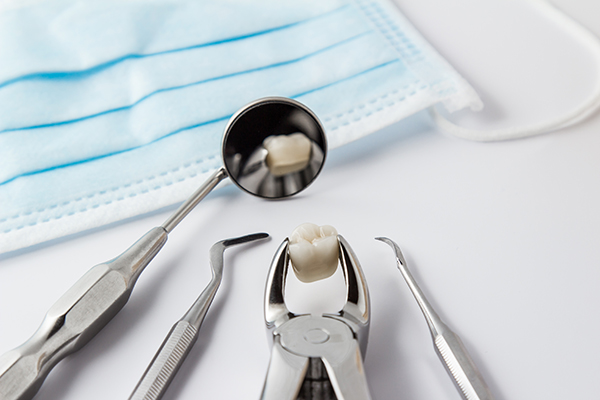
What is a Wisdom tooth extraction?
At some point in your life you may require a tooth extraction, which is removing your tooth from the socket in your jaw bone. There are two categories of teeth extractions. It could be a simple or a surgical extraction. Your Coral Springs dentist can determine the type of extraction needed. You may need a wisdom tooth extraction for several reasons including pain, a broken tooth, impacted wisdom teeth, or not enough space for all your teeth for proper alignment.
A simple extraction is when your tooth is visible above the gum line and the tooth can be easily extracted with forceps. Your Coral Springs dentist will first use a tool called an elevator which loosens the tooth, once loosened; they will use another tool called forceps to lift the tooth from the socket. This type of extraction is usually performed with just local anesthetic. During the procedure you can expect to feel pressure but shouldn’t experience any pain.
A surgical extraction of wisdom tooth is a more complex extraction and involves cutting of your gum tissue and bone to remove your tooth from its socket in your jaw bone. When you have a surgical extraction, you will also have local anesthetic to numb the area being worked on. As with a simple extraction, you shouldn’t feel any pain, only pressure. Some patients opt to have conscious sedation, which means you are asleep but not totally under as with general anesthesia. With conscious sedation, you will not remember any part of the dental procedure; it includes a sedative and an anesthetic. Talk to your Coral Springs dentist on the best option for you for a dental extraction.
During your lifetime, you may experience the need for a dental extraction due to a broken tooth. There are different reasons a tooth may break which can be from decay, medications that weaken the tooth, or biting into something hard. You may need teeth removed for orthodontic reasons as well. Your dentist in Coral Springs may recommend extractions during orthodontic treatment if you do not have enough space in your mouth for your teeth to properly align. You could develop loose teeth from a periodontal condition that may require teeth extractions if they are not savable. Your Dentist may also recommend your wisdom teeth also known as your third molars to be extracted if they are causing you pain or will in the future. Some patients do not have enough space in their mouths for wisdom teeth or may develop decay or irritated gum tissue.

You will want to follow some guidelines after a dental tooth extraction to assure proper healing. The first thing will be to change out you the gauze you receive from the dental office. Your dentist or dental assistant will apply gauze to the extraction site and you will want to bite down on this for 15-20 minutes to help form a blood clot for healing. Following your wisdom tooth extraction you may want to put ice on your jaw. You will do this for 20 minutes on and 20 minutes off for the first few hours after to help decrease any swelling that may occur. Your dentist will also recommend to do salt water rinses 24 hours after the extraction. The salt water works as an aide in healing your tooth extraction site. You will have a hole in the area that needs to stay clean during the healing period.
During the healing period you will also want to avoid any straws, smoking or spitting which can cause a dry socket. A dry socket occurs from dislodging the blood clot in your extraction site. If this occurs, it can be very painful. You can also take ibuprofen or Advil to help with any pain or swelling that occurs. Any bleeding should go away within a day or two after the extraction. However, it can take a few weeks to heal completely. If you have any question about wisdom teeth removal surgery, please ask us anytime. We’re here for you!
